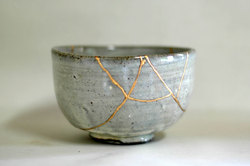|
As Spring makes its slow but steady way to us, it calls to mind the newness and oldness of things. New leaves on trees, new buds blooming in gardens. There is a difference, though, between the buds freshly planted in gardens and roadside parks, and the re-emergence of perennials or blooms on trees that have come to be old friends. New-new, and old-new. Some of these new-new flora are placed and planted at the moment of perfection, at the height of their bloom. Then, too, they are whisked away at the first sign of fading to be replaced with the fresh and the new. This process, indeed this industry, grows in line with our consumer culture which seems to forever chase the new, the next. This is a very Western approach to our surroundings, and to ourselves, We value the young, the new, and we relentlessly pursue perfection. When something is broken or imperfect, we find it useless and ugly. Rather than refurbish or repair, we are quick to replace. Psychically, this takes its toll. If we find ourselves imperfect or broken, we feel unworthy, unlovable, ashamed. We attempt to hide our faults and imperfection from one another and often from ourselves.  Photo credit David Pike Photo credit David Pike
The Eastern philosophy of wabi-sabi. can help us see and relate to ourselves in a different way. This philosophy cherishes the simple, unpretentious, and aged. The Eastern craft of kintsugi takes this idea from philosophy into art form. Literally golden (kin) joinery (sugi), this practice involves the careful repair of broken ceramic pieces with a combination of resin mixed with gold. The result is that the fractures in a piece are highlighted by the gold, making the object more beautiful than it was before. The object (vase, teapot, bowl) that was valued is understood to be worth the care and love expended to repair it, and is in fact more beautiful for having survived.
The fresh buds on a cherry tree are to be cherished not just for their beauty in the moment, but for visually reminding us that the tree, our old friend, has survived the winter. Similarly, the laugh-lines on a grandmother's face are a sign of life well loved and well lived. We do a disservice when we try to hide our brokenness, our past, or our flaws, or pretend they never happened. These were (and are) pivotal moments in our lives that, when looked upon with care, can begin great transformation in our lives. |
About the AuthorClinical psychologist Dr. Kristy Novinski contributes insights, book and film reviews, discussions of pop culture, and exploration of news and research in the field of psychology. What I'm Reading
Categories
All
|
Las Colinas Psychological Services, PLLC |
© 2023 Las Colinas Psychological Services, PLLC. All rights reserved.
|

 RSS Feed
RSS Feed

